Contents

Fix YouTube Market Research With YouTube Scraping
The Mistake You’re Making in Market Research—and How You Can Fix It with YouTube Scraping…
Ever wondered why your Youtube marketing research isn’t giving you the results you want?
Market research is the backbone of a successful business strategy. From cracking customer behavior to outsmarting competitors and spotting the next big trend—everything starts with solid data.
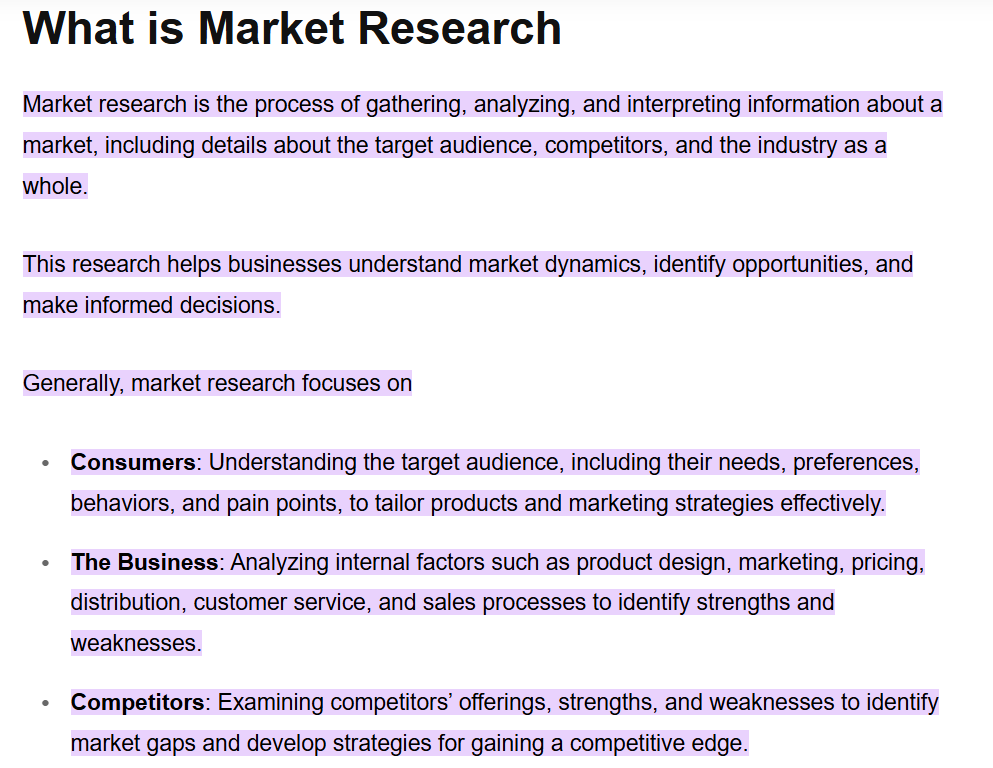
Yet, many businesses overlook one of the most powerful data sources out there: YouTube.
With millions of videos covering everything from viral trends to niche product reviews, YouTube is a goldmine for insights.
But if you’re still relying on outdated research methods, you’re leaving valuable information on the table.
So, how can you fix it?
YouTube scraping!!
By extracting key data—like views, comments, and trending topics—you can avoid common market research pitfalls and make smarter, data-driven decisions.
Here’s the deal:
YouTube is packed with content on almost everything—from global trends to highly specific niches.

- People flock to YouTube for answers, making metrics like views, likes, and comments invaluable for understanding audience behavior.
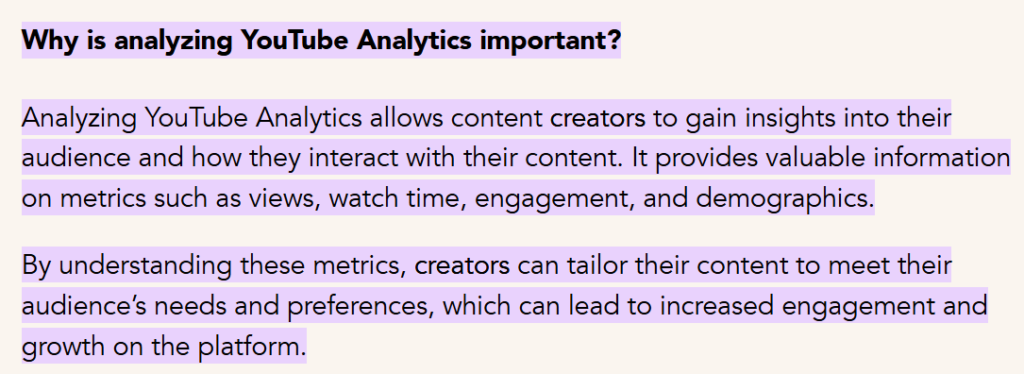
So, if you’re not leveraging this, you’re missing out on actionable insights.
Chances are, your market research is falling short due to one of these common mistakes. Let’s dive into what they are—and how scraping YouTube can help you overcome them for good.
But first;
What’s YouTube Scraping?
YouTube scraping is simply the process of collecting data in a smart, automated way.
This means using a tool to collect video analytics that tell you what’s popular and what your audience craves.
It’s perfect for anyone wondering how to do marketing research without the fuss of manual browsing.
With YouTube scraping tools, you get insights in minutes, making research way easier.
And if you are wondering how to do market research for a startup, YouTube scraping gives you the audience insights and trends you need to shape a successful plan from day one.
Here’s what you can scrape:
- Video titles
- Hashtags
- Views
- Likes and comments
- Video metadata
The Market Research Mistakes You’re Making
Mistake #1: Using Outdated Data
Old reports or surveys make it difficult to rely on that information. YouTube has become a dynamic platform, where new trends are coming into being and millions of views shift every day. Old data causes missed opportunities and irrelevant strategies.
Fix:
Utilize real-time collected data based on tools like the YouTube Scraper provided by ScrapeLead. Extraction of the latest video titles, comments, views, and trends ensures that the market insights are accurate and updated, thereby staying ahead of the curve.
Mistake #2: Not Using the Proper Tools
Traditional methods such as surveys require much time and are very incomplete. Poor quality tools may lead to unreliable results, thus slowing down the effectiveness and accuracy of your market analysis.
Fix:
Make use of automated tools such as YouTube Scraper that aggregates data easily in comprehensive statistics to track views, engagement scores, comments, and the latest trending topics all live in real-time, helping to save time while maintaining much accuracy in your findings.
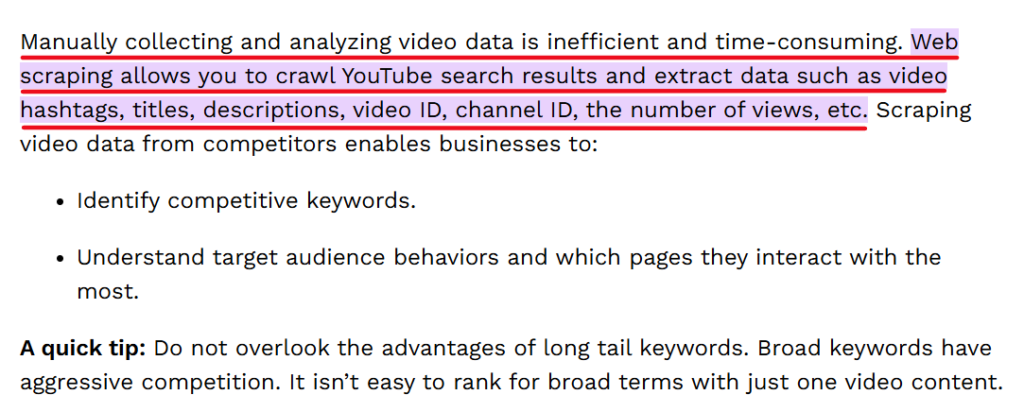
Mistake #3: Ignoring Audience Sentiments
Focusing solely on numbers like views and likes may leave you blind to audience opinions. Ignoring how your audience feels about specific topics can result in disconnected strategies.
Fix:
Utilize YouTube scraping for comment gathering and analysis to gather insight on audience sentiments. You’ll know what they’re saying and feeling in the process of making content that people relate to and connect more deeply with.
Mistake #4: Over-focusing on competitors
While competitor monitoring is necessary, mere imitation can limit the scope. You may end up missing larger trends and some singular opportunities to stand out from your brand.
Fix:
Expand your scope to understand audience behavior and trends. A YouTube scraper can tell you what is trending and going on in conversations, allowing you to tap into the unnoticed opportunities and develop innovative ideas.
How YouTube Scraping Helps Fix These Mistakes
So, how does YouTube scraping solve all these common research mistakes?
By using YouTube data scraping tools, you can:
- Collect real-time data from trending videos, comments, and more.
- Get audience sentiment through detailed comment analysis.
- Discover new trends and insights from a wide range of videos, not just your competitors.
- Automate your research to save time and effort.
Why Scrape YouTube for Youtube Market Research?
Here are a few reasons YouTube scraping can take your marketing strategy for YouTube channel to the next level:
- Quickly see what’s hot!
- Learn directly from viewer comments.
- Stay ahead by keeping tabs on what your competitors are doing.
- Get creative inspiration from trending videos and niche topics.
- Base your strategies on concrete data, not guesswork with the help of YouTube comments analysis.
- Automated scraping tools save hours of manual research, freeing up valuable time.
- Effective market research minimizes campaign failures and maximizes your returns.
- Access large volumes of data, making research scalable for businesses of any size.
With YouTube scraping, you can streamline your research process and extract actionable insights to kickstart your marketing strategy!
A Simple 5-Step Plan to Scrape YouTube
Let’s go over the steps to start scraping YouTube like a pro!
1. Choose the Right Tool
Grab a solid YouTube scraping tool, like ScrapeLead’s Youtube Scraper!!
It’s great for grabbing everything from video analytics like titles, views to YouTube comments analysis, making market research simple.
With our scraper, you can skip the manual work and go straight to insights, helping you spot trends, get new content ideas, and grow your channel faster.

2. Select Your Keywords
Before scraping, narrow down your focus with keywords related to your industry.
If you’re unsure about how to research keywords for YouTube, think of phrases that relate directly to your content or market.
For instance, if you’re in the scraping industry, try terms like “data extraction tools” or “web scraping tutorials.”
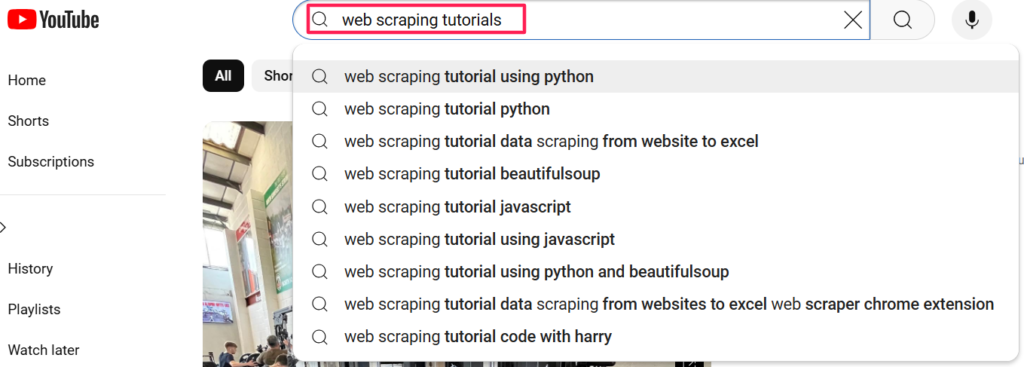
Enter the URL
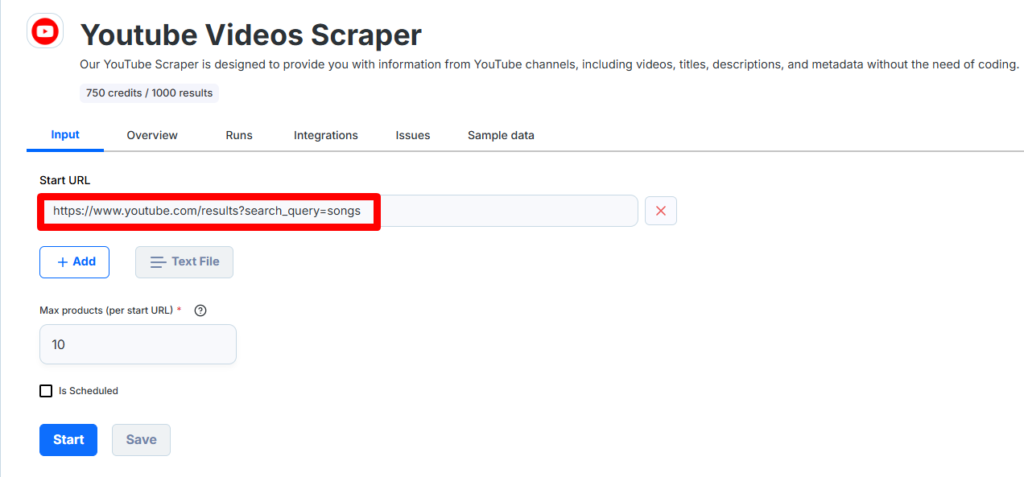
Getting keywords right is key for how to do keyword research for YouTube effectively.

3. Set Filters and Key Data Points
Decide on the data you want to pull. Here’s a list to get started:
- Video Metadata
- Channel Data
- Comments
- Thumbnails & Durations

With these filters, your research will go from “messy data” to laser-focused insights!
4. Run the Scraper
Once you’ve got everything set up, it’s time to hit “go.”
And let the tool pull in data on trending videos on Youtube.
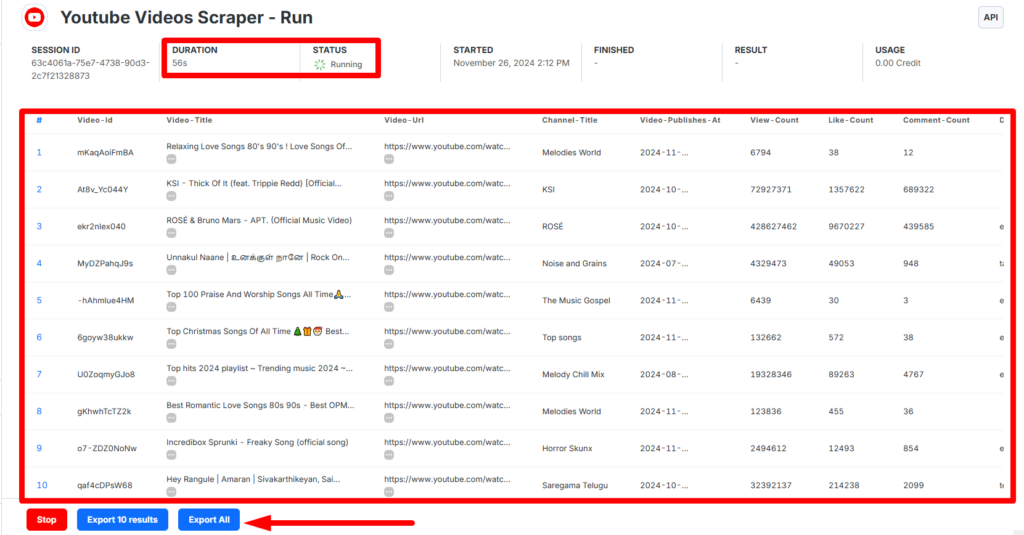
Larger datasets may take time to collect, so be patient for the best results!
and grab a coffee.
5. Organize Your Data
After scraping, you’ll likely have all your data in a spreadsheet.

It’s super helpful to organize it based on keywords or video analytics like views and publish dates.
This makes it easy to spot trends or get ideas on how to grow a YouTube channel fast by replicating popular content.
Strategies for Youtube Market Research Using YouTube Data
After scraping data, it’s time to leverage it for market research.
Here are some effective strategies:
1. Spotting Trends
Find popular keywords and topics to predict where your market is heading.
Here’s where to quickly find popular YouTube keywords:
- YouTube Search Bar: Type a topic, and check autocomplete suggestions.
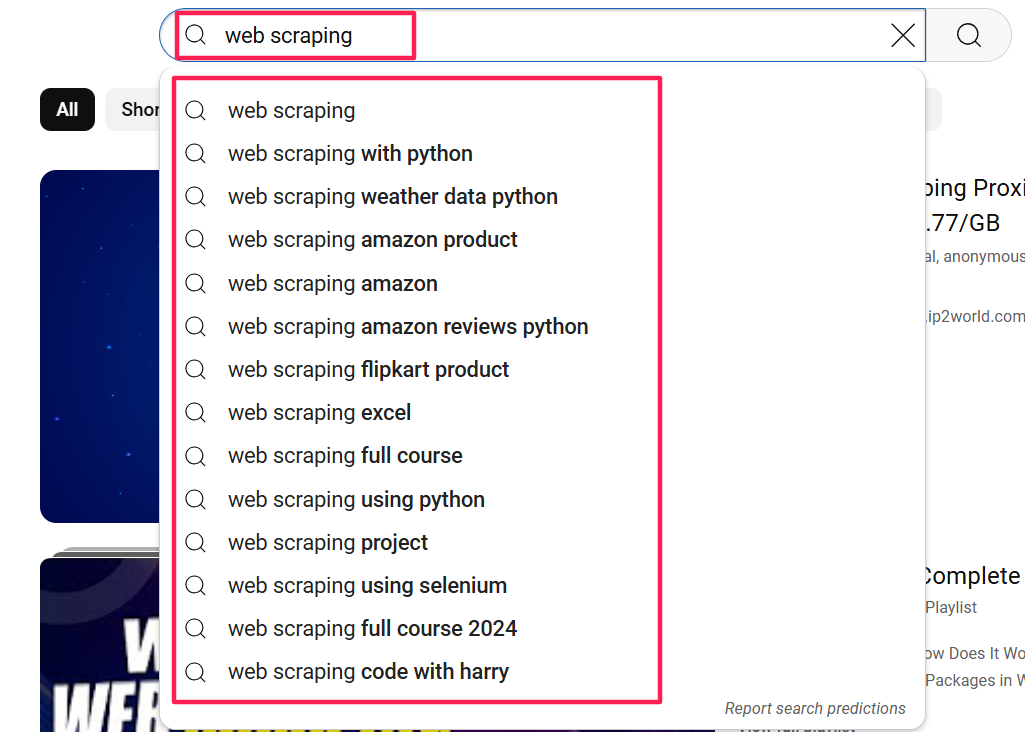
2. YouTube Analytics (for Your Own Channel): Go to Analytics > Reach for keywords bringing traffic.
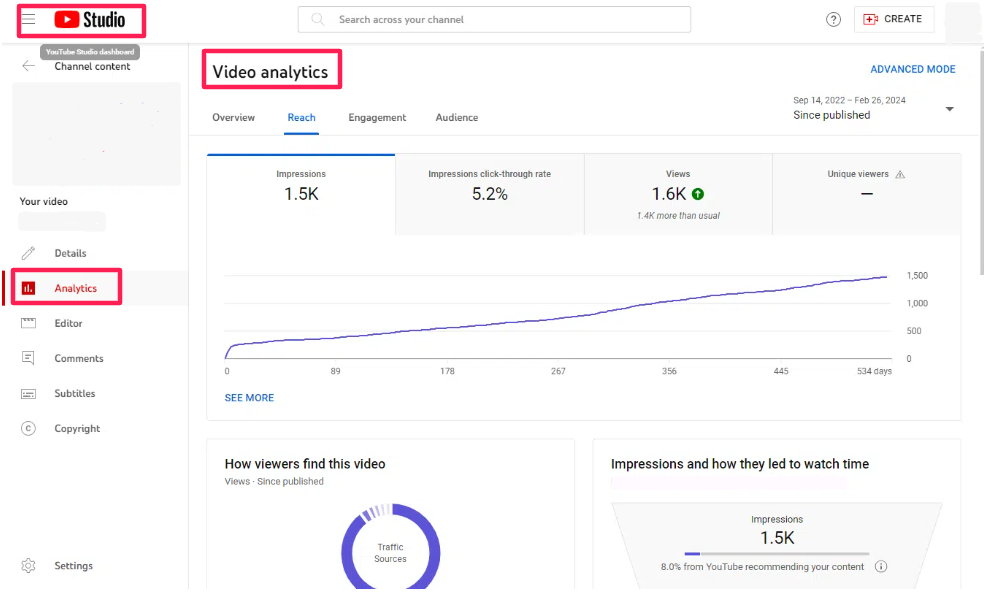
3. Google Trends: Visit Google trends and set to “YouTube Search” for trending topics.
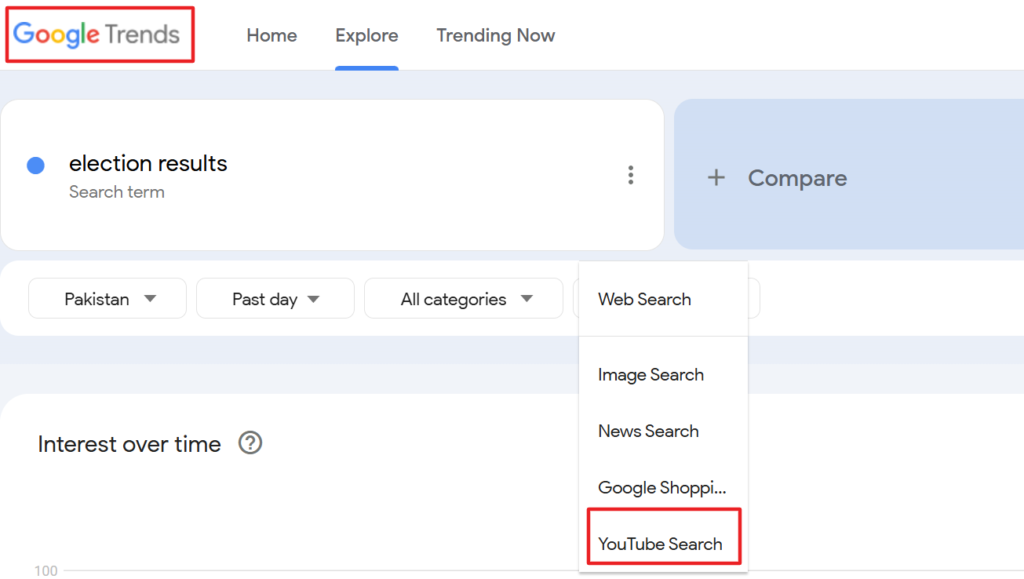
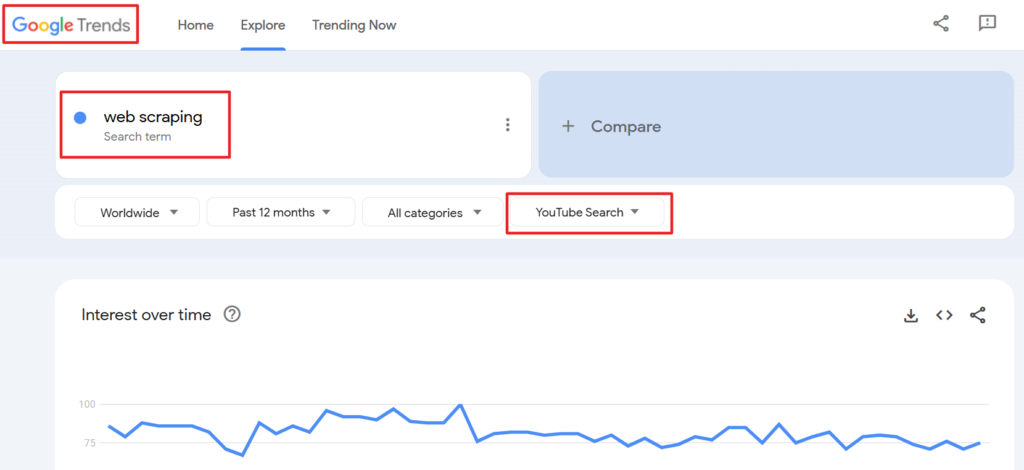
Example: Check out the most-viewed videos in your niche to find repeating themes, like certain product types or styles that keep popping up.
2. Comparing Competitors
See how your channel compares with competitors to find improvement areas.
Example: Study top videos from competitors and see what makes them successful. Try using similar themes or formats but add your unique twist.
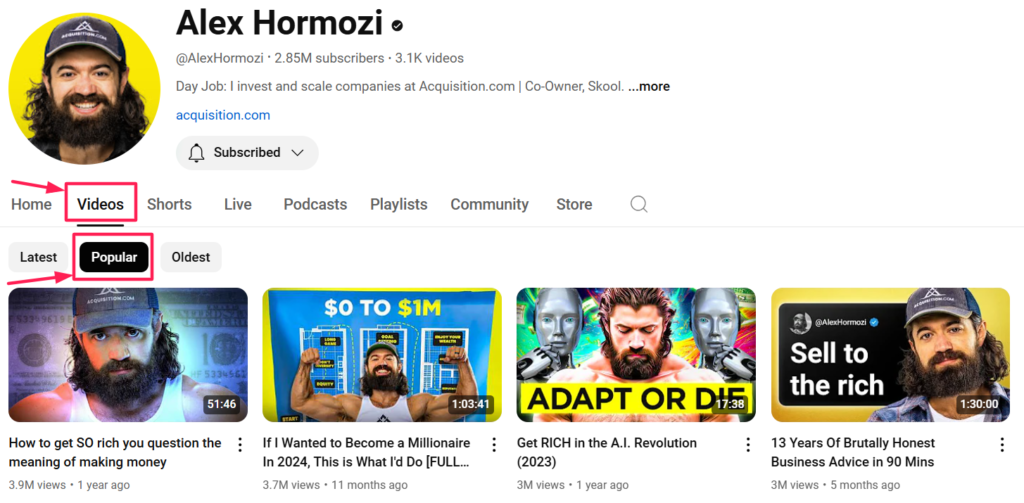
3. Sentiment Analysis on Comments
Use YouTube comments analysis to see what kind of content clicks with viewers.
Example: Analyze the comments section (see image) for viewer feedback. Positive and negative comments help identify what resonates with the audience.
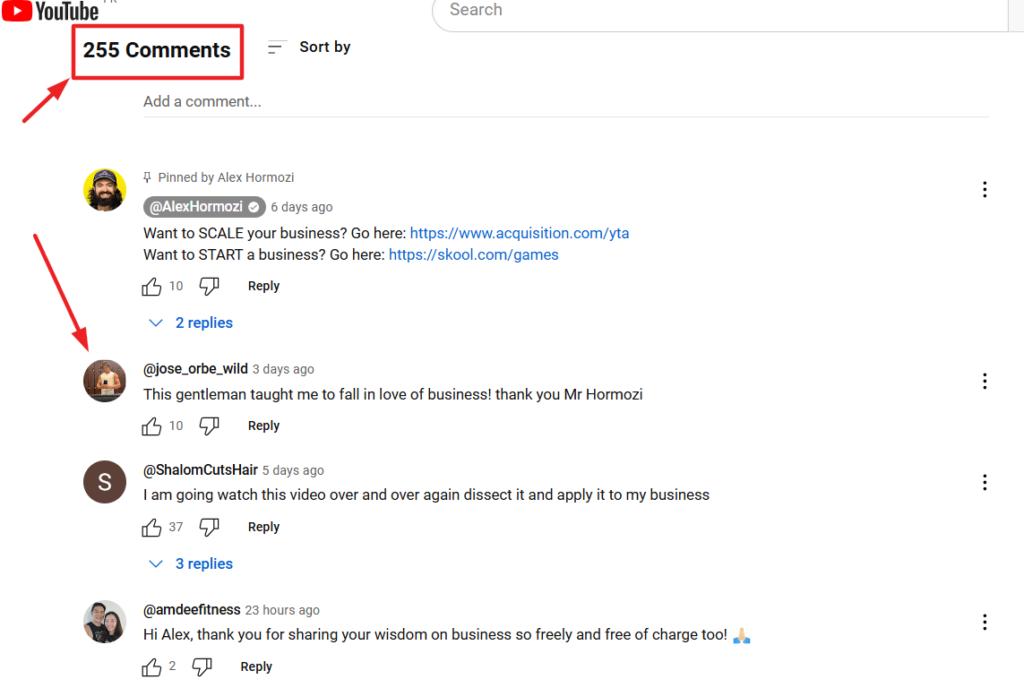
4. Finding Influencers
Identify influencers who have strong engagement rates for potential collaboration.
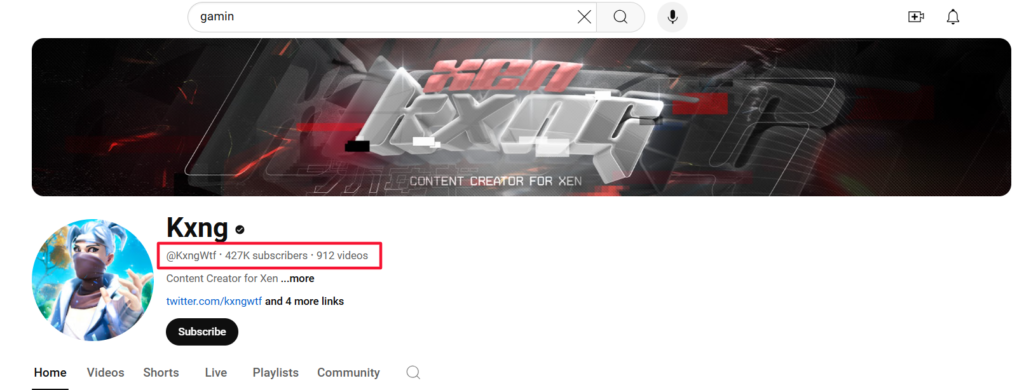
- Example: Look for influencers with a high view-to-subscriber ratio, as this suggests they have an engaged audience. Partnering with them could boost your visibility.
Tips for Effective YouTube Scraping
Here are a few pointers to get the most out of your YouTube scraping:
- Avoid pulling too much data all at once to keep things manageable.
- Stay within YouTube’s policies to avoid any issues.
- Use filters to get data on trending videos on YouTube only or specify dates to keep your insights fresh.
- Trends can change fast on YouTube. Running your scraper regularly keeps you updated on how to find trending topics on YouTube.
Wrapping It Up
Fixing your market research starts with using the right YouTube scraping tools. With these tools, you can uncover valuable insights to guide your marketing strategy for YouTube channels.
ScrapeLead’s YouTube Scraper empowers you to collect real-time, actionable data, helping you stay ahead of trends, gain deeper audience insights, and streamline your research process.
Whether you’re figuring out the best niche to grow on YouTube or just looking for tips on how to grow a YouTube channel fast, scraping gives you the data edge you need to create content that resonates.
Ready to take your strategy to the next level? Grab ScrapeLead’s YouTube Scraper, select the right keywords, and let YouTube data work its magic for you!
FAQ
In research, data scraping is a method to automatically pull data from websites into files or spreadsheets. It’s useful for collecting large datasets for analysis or reuse, with many tools available for automation.
Why is data scraping illegal?
Simply input the video or channel URLs, and the tool will automatically collect valuable data like video titles, views, comments, likes, and more. Download the structured data in formats like JSON or CSV for analysis and decision-making.
Data scraping is when tools are used to collect information from a website or app automatically. Doing this without permission goes against the Terms of Service.
With YouTube scraping, you can collect data like trending topics, video performance (views, likes, comments), audience feedback, and competitor analysis. These insights help refine your strategy, improve content, and make data-driven decisions.
Start scraping instantly
Sign up now, and get free 500 credits everymonth.
No credit card required!
Related Blog

Is Web Scraping Legal in US? Check Web Scraping Legality
Understand the legality of web scraping. Is web scraping legal or illegal? Explore ethical practices, legal risks, and real-world cases.

Explore the Top 9 Challenges in Web Scraping
Web scraping challenges like CAPTCHAs, website changes, and dynamic content can be tricky. Learn practical solutions to tackle these obstacles.

Scraping Amazon Prices for Business Growth
Scraping Amazon prices is the key to smarter business decisions. Learn how to do it easily with a no-code approach!

